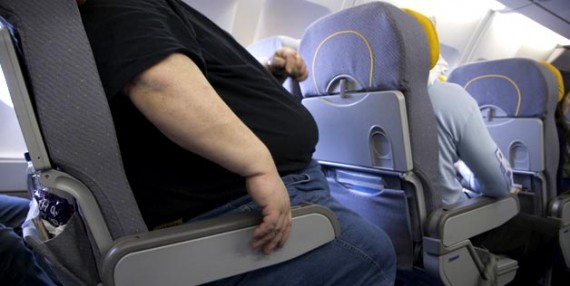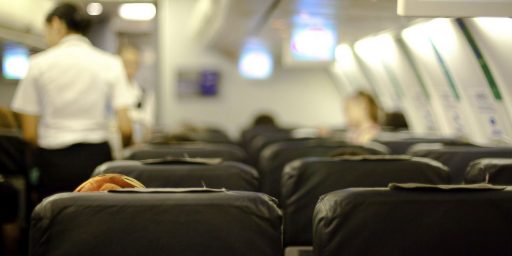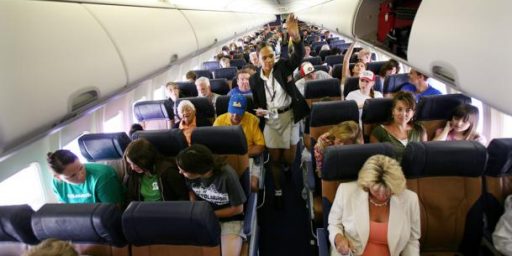Weigh More, Pay More?
Peter Singer argues that heavy people ought to pay more to fly.
Peter Singer argues that heavy people ought to pay more to fly.
I am writing this at an airport. A slight Asian woman has checked in with, I would guess, about 40 kilograms (88 pounds) of suitcases and boxes. She pays extra for exceeding the weight allowance. A man who must weigh at least 40 kilos more than she does, but whose baggage is under the limit, pays nothing. Yet, in terms of the airplane’s fuel consumption, it is all the same whether the extra weight is baggage or body fat.
Tony Webber, a former chief economist for the Australian airline Qantas, has pointed out that, since 2000, the average weight of adult passengers on its planes has increased by two kilos. For a large, modern aircraft like the Airbus A380, that means that an extra $472 of fuel has to be burned on a flight from Sydney to London. If the airline flies that route in both directions three times a day, over a year it will spend an additional $1 million for fuel, or, on current margins, about 13% of the airline’s profit from operating that route.
Webber suggests that airlines set a standard passenger weight, say, 75 kilos. If a passenger weighs 100 kilos, a surcharge would be charged to cover the extra fuel costs. For a passenger who is 25 kilos overweight, the surcharge on a Sydney-London return ticket would be $29. A passenger weighing just 50 kilos would get a discount of the same amount.
Another way to achieve the same objective would be to set a standard weight for passengers and luggage, and then ask people to get on the scales with their luggage. That would have the advantage of avoiding embarrassment for those who do not wish to reveal their weight.
Friends with whom I discuss this proposal often say that many obese people cannot help being overweight – they just have a different metabolism from the rest of us. But the point of a surcharge for extra weight is not to punish a sin, whether it is levied on baggage or on bodies. It is a way of recouping from you the true cost of flying you to your destination, rather than imposing it on your fellow passengers.
This strikes me as rather silly. If we take Singer’s data as face value, added passenger weight has a negligible impact on fuel costs. $472 in fuel costs on a large airliner (which seats 525 people) on an incredibly long flight is next to nothing. After all, a flight from London to Sydney is billed at more than $2000 per passenger. And, frankly, it would almost surely cost more than $472 per flight to carefully weigh, assess, and haggle with 525 passengers.
via The Browser







Though I wouldn’t mind if they were charging overly obese people for two seats when they spill over into the next seat.
Or simply make bigger seats and charge more per seat.
(My major pet peeve with airlines is that they don’t have a “no kids” section. 6 hours of flying with a little monster kicking the back of the seat in front of him (me) and pulling my hair, while Mom refuses to do anything–no thanks. )
The basis for his argument is baggage fees…which are simply revenue generators…and have nothing to do with weight. If the basis of your argument is flawed…
Reading the title of this post, I hoped it would be a proposal to have the obese pay more for insurance. If they want to stuff their fat faces with fatty food, leading to (preventable) health problems down the line, then why should I be forced to subsidize that behavior?
And would you look at that… guess which voters would get hit the hardest? Perhaps that’s just frosting on the cake.
@Gold Star for Robot Boy:
They already do, at least if they’re buying an individual plan. If they’re on a corporate plan, though, they typically don’t because of pooling.
This is of course one of the complaints with government run healthcare: that once it becomes the taxpayers responsibility to pay for it, it will be used as an excuse for government intrusion into all manner of personal behaviour. So to put it in your own language: you should be forced to subsidize that behavior because fat people have a right to healthcare.
@Stormy Dragon: Sure, but many of those same fat people are more than happy to moralize about young hussies and their govt-subsidized contraception.
Why should that apply just to obese people? If such a policy were to actually be instituted, why shouldn’t anyone who has a lifestyle that leads to (preventable) health problems also have to pay more?
@An Interested Party: For the sake of consistency, we should – no argument here. But as long as America is hellbent on imbedding culture war landmines into health care policy, I want to get my licks in.
@Gold Star for Robot Boy:
I see, so using government policy to enforce your aesthetic preferences is only wrong when they do it?
@An Interested Party: Yeah! Like old people. Those people get sick and die at a much higher rate than the rest of us!
@grumpy realist: Restaurants and movie theaters too. You had a kid, more power to you. But it’s called sacrifice, like not going out on Friday night for a few years, sparing us a tantrum while we dine or watch a film.
@Stormy Dragon:
Presumes rationality.
Before we get on the military rotator flights when we deploy, they weigh both the person and our bags. The total amount is what’s put into the computer for flight planning.
As somebody pointed out above, the commercial airline’s baggage charges are largely just a money making scam. But, as long as they’re going to be euphemistically called a “fuel surcharge”, then I think the example quoted in your article above is perfectly logical … why should a small person with a heavy bag pay more than a large person with a smaller bag? .. especially if person #2 actually has a higher total weight.
Either get rid of the “fuel surcharge” (preferable). Base it on total weight. Or at the very least stop pretending that extra baggage charges have anything to do with fuel costs.
@Gold Star for Robot Boy:
Black voters, actually. Followed by Native American voters. Followed by Hispanic voters. Somewhere behind that falls those rural white voters you envision when you look at county obesity rates in the south.
I wonder if Peter Singer is saying that Weigookin (Korean for “strangers”) should actually pay more than Hangook sarang (Korean for “Korean people”) in which case is he arguing that he should pay more since he probably weighs more than she does, too? Or is he only making the case for “that fat guy over there?”
Having read many of Dr. Singer’s articles, I would guess case two, but I might be wrong.
Re. Health costs, it came through on twitter that 5% of patients consume 50% in costs in the US. I guess the next question is whether they are chronic or terminal. It would be sad if 30 days of futile treatments separate us from the lower cost countries.
Assuming the 5% claim is accurate.
This only makes sense if charging extra for an 81lb (but not 80lb) bag makes sense, which it does not.
I assume this is saying that 525 * 2kg = 1050kg = 2315lbs added weight uses $472 in extra fuel costs. So it’s 20 cents per pound from Sydney to London, let’s make it 5 cents per pound for a more normal length trip.
My family would gladly take this discount so that my 32-lb four-year-old would save $60 over an obese 332-lb person. That discount is certainly not “next to nothing”.
@Franklin: Oops, bad math: that’s only a $15 savings, not $60. That’s certainly getting a bit closer to negligible, considering I used an extreme example.
I think this could work if a large, platform-like scale was inexpensive. When people walked up to the counter, they just stand on it with all of their luggage.